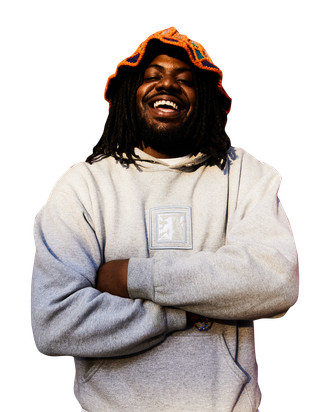
Every album by Mike, the 24-year-old New York rapper, answers the same question: How is Mike doing right now? Since 2016, he’s dropped a record each year on the first day of summer, June 21, with a few others in between. Early projects like 2017’s breakout May God Bless Your Hustle found Mike, born Michael Bonema, confronting his depression while coming of age; on 2019’s Tears of Joy and 2020’s Weight of the World, he processed the death of his mother in real time. Mike began to explore more complex territory on 2021’s Disco! as he paired pensive bars with upbeat samples to match the title. After that, he skipped the summer release date for 2022, instead dropping his latest, Beware of the Monkey, on the first day of winter, December 21. Still, he wastes no time getting the listener up to speed. Opening track and lead single “nuthin i can do is wrong” begins with Mike singing along to a sample of “I Just Want to Love You,” a 1983 soul ballad by Forrest. For a few seconds, you can hear Mike’s warm smile coming through the track.
Mike says he made Monkey during a remarkably steady period in his life. Continuing a thread from Disco!, the new album finds him comfortable and assured of his position in music; he carved a place in the genre for his dense, moody, and soulful hip-hop and brought up a whole scene of like-minded New York collaborators in the process. But like his other work, the album bears the signs of the struggle to get there. Monkey takes its title from the Chinese zodiac, which has been on Mike’s mind lately — in 2022, he returned to his birth year, the Year of the Tiger, which is supposed to bring difficulty. (“I’m one of those people that take everything as a sign,” he says with a laugh.) Mike makes space to process those hardships on Monkey, too, amounting to an album that lands in a richer and more emotionally complicated place than merely happy or sad. Take three bars in the middle of the single “What Do I Do,” where Mike shifts between reflective, mournful, celebratory, and assured. “All this pain of it dead is behind,” he raps. “It was strange, but it never defined me / Overcame, ain’t no regular guy.”
Mike had a radiant grin on his face as he unpacked the emotions behind Monkey on a recent afternoon video call, between puffing on a joint and showing off his new puppy, Mezcal. He also spoke about what draws him to a sample, his New York scene, and how Sister Nancy named their collab “Stop Worry!”
It was interesting to see June 21 come and go this year without a Mike album.
[Laughs.] Yeah.
What was it like for you to wait longer on something?
I feel like it helped me practice patience. Knowing how to break out of the plan, too. It taught me how to not be so rigid about things. I’m still kind of on the schedule thing, but I was like, Yo, I’m taking a big step out of my normal boundaries.
It feels like this album is more than just a snapshot of your past year because of that. What united this album?
It’s based on Chinese astrology. Beware of the Monkey is something that it tells the Tiger to do. This year is the Year of the Tiger, and I was born in the Year of the Tiger, 1998. I had read that the Year of the Tiger is supposed to be the super-difficult year for the Tiger. It was crazy because I felt like I had just came off this super-exciting, free — like yo, I lowkey learned how to ride a bike last year. It was one of my biggest years. But then, even before the year ended, I could sense this, like you know when a nasty air comes in, kind of like when somebody just farted or something? I was like, Yeah, shit is about to get a little bit weird. And the astrology shit was kind of correct, ’cause it was definitely an interesting year. Just so many personal obstacles, things that I was dealing with, like, with myself. Then it would be weird because there’s a lot of accomplishments on the other side of all that shit this year — I be telling my manager, Naav, and the homies, this is the most stable I’ve ever been. But still, there’s this self-conflict. The Monkey is supposed to be like the thing playing tricks on you, but then what I ended up figuring out toward the end of the project was it was lowkey the tricks that you play on yourself. If you read the story of the Monkey and the Tiger, the only reason why it tells the Tiger to beware of the Monkey is ’cause the Tiger was being too prideful.
I love the samples you use on your albums. What makes a song or a bit of music speak to you?
It’s always about the emotion and character. I draw toward people that are not necessarily focused on skill but are more so focused on, “This is who I am.” I think everybody’s a wonderful character, at least to somebody. It’s nice when you’re able to hear that through music. When I was looking for samples or loops, I’m not worried about shit like the cleanness, I just want something that feels intentional. Like you said, what’s speaking to me is it feels like this person made this song. Especially in a lot of the samples I used for this project, it was the character that really stood out to me, and, like, what can I see when I listen to this? What type of energy is this giving me? Sometimes expressing an emotion that’s more than just sad or happy, like an emotion that’s happy but grieving. How do you hear that through the beat? And some samples straight up be giving that to you, like it be crazy.
I have this one song called “Storm in the Calm,” and the beat for that, I was telling a homie, it felt like God literally gave me that sample to keep me going. [Laughs.]
It finds you.
For sure. One of my favorite ones on the new one is a song called “Eczema.” I made the beat last year, and it felt good, but it felt like I was trying to be too skillful. And I listened to the sample over again, and it’s just a live band drumming and somebody playing piano and shit, but weirdly, and maybe this is the way it’s recorded, it deadass sounded like somebody said, [imitating a record scratch] “Chk-chk.” [Laughs.] And I was like Nah, that’s so fucking fire. Not only is it fire, it’s also hella cute. It has character, too.
I gotta know just — how do you actually get Sister Nancy on a song?
I’ve been a fan of Sister Nancy for a long time. She’s always been another person that I felt like has so much character, and it comes through so lucid through her music. She’s not afraid of being herself, and you could hear it. I watch a lot of her old shit on YouTube because I’m like, Bro, this type of confidence on stage, this is how you really command your space. 2021, we did a tour, and we had her play the last show in New York City. You know when you’re just throwing names out there and shit? I was like, “Yo, let’s see if we can get her on the thing.” We got her on the show; the shit blew my mind. She invited Marcia Aitken, the person who did [singing] “I’m still in love,” like the shit that Sean Paul got that song from. She did it live over a different beat, and I was like, This is what it’s actually all about.
A few months go by. I got this one, it was called “Wake Up” originally, and it had the reggae bassline, but it’s not even like a reggae song. I was thinking of who to get on it, and I was like, I’m not finna get no reggae artist ’cause that’s kind of corny. But then I was like, Oh, nah. I could get the reggae artist. And she was down. We even tried to keep her more professional than usually we keep it; we tried to get her to do a contract. Then her manager hit us back saying that she said to “stop worry.” [Laughs.] And I lowkey was like, That was hella G, and I ended up calling that the name of the song.
As you’ve been rising, you see keiyaA, Navy Blue, Mavi, and all these people who you have been associated with blow up. People talk about you as a key figure in this sort of scene. Are there moments when you remember thinking, This is something special going on here in New York with all these people?
I go through that moment like two times a year. A lot of us, I feel like we live a mutated life that has now come with new pathways, not from the usual pathways. Beware of the Monkey is the first project that is mixed by somebody else, real professional style. Since I’ve been making beats and shit, I was using the same laptop that I got from high-school graduation. I’m 24 now, and I just got a desktop like two months ago. Sometimes I would look at the laptop, and then I would just look around and be like, What the fuck? I’ve built my life off of this laptop that be crashing on me every single day, that has the dumbest stickers on it. But it showed me that there’s a pathway and that a place where you think there’s nothing, there’s something. And I’m not gonna lie, it showed me magic. I think that’s what the whole New York shit is about, is that people are realizing their magic, and the magic to turn an idea into so much. Then you get keiyaA, then you get Mavi, and these are people that I’m glad to have even known them before. Now seeing everybody in their greatness — like, bro, it’s been there. The magic has always been there, it’s just when you start to get into the motions of using it.
You had an EP come out earlier this year with Wiki and Alchemist. That was through a deal with Tommy Hilfiger and Patta. I think that surprised a few fans who aren’t used to seeing you do something branded.
[Laughs.]
What was the decision-making behind that?
The homie Al had put me on, and he’s been cool with those Patta people from back in the day. He was like, “We’re gonna try to get Wiki to be a part of the project.” Wiki is somebody that I have so much respect for and has inspired us. I was excited — we’ve been talking about doing stuff for a long time, now we finally got the chance to be able to do something, and then there’s people trying to fund it as well? And Al is, like, lowkey a legend; he’s the guy. So it came through smooth.
At the beginning, I was kind of funky about it ’cause I’m not really a model type of guy. [Laughs.] But I’m not gonna lie, I definitely do love drip. But then I was like, Yo, I’m scared I’m about to do the Tommy Hilfiger shit and just be on some Wu-Tang shit. But then I’m like, You know what?
I feel like we’ve been trying to reach this middle ground, where it’s the young people and also the older people, just so they know we in this together. And that’s what’s been cool, too, with the Patta shit, those are some real OGs. They from Amsterdam, but when they come out to New York, it be crazy. Everybody be knowing them niggas. And it’s cool seeing it now, like, Oh, it’s our turn to do the trips to Amsterdam. Then 20 years, 30 years down the line, I’m like Alchemist. I got my homies in Amsterdam, and I’m like, “Yeah, there’s these people in New York that you should work with.” When I see it now, I’m like, Ah, yeah, this is a beautiful thing.
You have this really good sense of past and future. Before we talked, I reread this interview where you were talking about Earl Sweatshirt and feeling like he’s mentoring you but also he’s teaching you how to be a mentor to the people afterward.
I appreciate that. I never even thought of it like that. You know when you have those things that you think about all the time, but you never really put it into one thing? That was a good understanding of it. You just made me feel mad wise.
Last year with Disco!, there was some conversation like, “It’s not quite a sad album; there are moments of hope on it.” Then this album, I hear that hope even more. It makes me think about what you were saying about trying to find something that’s beyond just happy or sad. Do you feel like that hope is something you’ve been moving toward in music?
Yeah, for sure, and also just being real about what’s going on. I had an interview where I was talking about this album called Nigeria ’70s Bump, and it’s a project that a lot of West African artists put together right after the Biafran War, which was a civil war in Nigeria. The mixture of emotions on that project inspired me so much, just in the sense of like, there’s victory, but with victory, you can feel this huge tone of sadness. It’s a sad victory. And it’s sometimes these sad moments that we also feel comfort in, and sad moments that feel reminiscent or feel nostalgic. Music is such a wonderful place for me to express myself and also express the depth of my feelings. It’s like, I’m feeling happy and conflicted. Or even maybe I am just feeling happy; maybe me feeling happy means I’m feeling ignorant, or I’m feeling like doing some stupid shit. But just living in these real moments and reminding people that, yeah, it’s not like I’m gonna be sad and then be happy and everything’s good.
I don’t wanna let people down, like, “Yeah, I’m feeling sad again, yo.” [Laughs.] Then I start getting under pressure, like, Now I gotta be the happy dude. Nah, y’all gotta learn to take me as this dude that overcame a lot of this shit, and that now that I overcame it, there’s also still a lot of healing to do. Now niggas be seeing me outside and be like, “Yo bro, I can get a pic?” I’m like, “Yeah I got you,” but I’m with my girl right here, or I’m with my sister, I’m with my nieces, or even I’m just like I don’t wanna fuckin’ smile in your pic, bro. [Laughs.] Like, if I wasn’t gonna take a selfie just now, what makes you think that I was gonna smile? When you’re being of service to people all the time, you forget that you can be so many different things. So I feel like with this project, I got to be human and do it for myself.
This interview has been edited and condensed for clarity.





